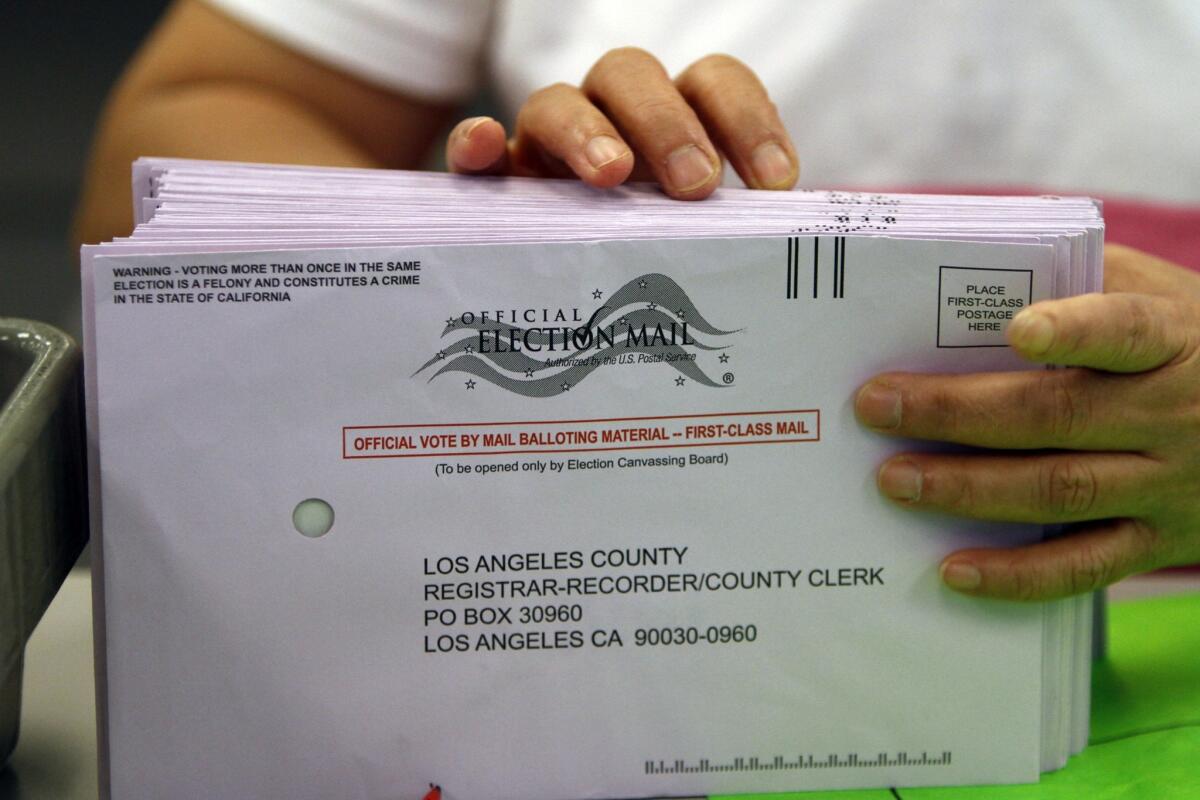If Biden wins, don’t expect Trump to accept defeat and head for the exit

- Share via
Should President Trump lose in the 2020 election, don’t expect him to concede defeat — it is simply not in his DNA to do so.
Consider the 2016 race, when then-candidate Trump lost the Iowa caucus to Texas Sen. Ted Cruz. While other losing candidates just moved on, Trump demanded that Cruz’s victory be nullified, tweeting the next morning, “Ted Cruz didn’t win Iowa, he stole it.” And when Colorado gave its convention votes to Cruz after nonbinding caucuses heavily favored the Texas senator, Trump tweeted, “How is it possible that the people of the great State of Colorado never got to vote in the Republican Primary? Great anger — totally unfair!”
For Trump, a personal defeat is always the result of fraud. Why would we expect him to react differently in the event of a Biden victory? He has already telegraphed his intentions, predicting that the 2020 vote will be the most corrupt in our history. In his election script, the only way for our electoral system to demonstrate its trustworthiness would be for him to win; a loss would simply confirm that the election was rigged.
Still, if Trump were to lose decisively, he would have no choice but to submit to defeat. In contrast to conceding, submitting to defeat is simply a losing candidate’s de facto recognition that further fight is futile. In submitting without conceding, Trump could certainly make mischief. He could, for example, encourage his supporters to take to the streets, triggering counter-protests met with ugly displays of federal force. But losing big would make it difficult for Trump to engage in more aggressive acts of constitutional defiance, such as trying to enlist Republican state legislatures to certify him as the winner in their states.
So, what would constitute a decisive loss for Trump? Given our peculiar system of electing a president, handing him a big loss in the popular vote guarantees nothing. Even beating Trump convincingly in the electoral college might not be enough. He has made clear that what will matter to him is how the vote count looks on election day.
“Must know election results on the night of the Election, not days, months, or even years later!” the president tweeted on July 30, just hours after he floated the idea of delaying the vote.
In the storm of coverage that surrounded the scandalous idea of an election delay, this tweet passed largely unnoticed. Yet it offers a disturbing glimpse into how Trump’s attacks on mail-in voting might presage an act of electoral defiance.
We know that in the 2020 election an unprecedented number of citizens will vote by mail, particularly in urban areas where the health risks associated with in-person voting are likely to be high. We also know that it will take days — or even weeks — for states to complete their full canvass of the mail-ins. And however long these state counts take, they will inevitably shift votes toward Biden and down-ballot Democrats, since urban voters vote overwhelmingly blue.
Trump knows this too. All Republicans recall the fate of Martha McSally, the GOP candidate for U.S. senator in Arizona in 2018. On election day, McSally enjoyed a 15,000-vote lead over her Democratic rival Kyrsten Sinema. By the time Arizona finished its tally of mail-in and provisional ballots, McSally had lost to Sinema by 56,000 votes.
That is why Trump’s tweet from July 30 should set off alarms. It suggests that if Trump has a tentative lead on Nov. 3, he will consider that tantamount to victory. Further, it suggests he would seek to discount any “blue shift” occurring in subsequent days or weeks as the product of fraud. To bolster his case, he will trot out the rhetoric he has been using lately: that mail-in votes cannot be trusted — and, more to the point, shouldn’t be counted.
From his powerful platform in the White House, Trump can be counted on to work tirelessly to ensure the count of mail-in ballots is plagued by delays, questions and confusion, deploying teams of lawyers to numerous states to challenge the vote in any way possible. He can also rely on Russia bombarding social media with fake news designed to undercut confidence in the states’ counts. The situation is tailor-made for a president who thrives on chaos and who is prepared to indulge any conspiracy theory that advances his political interests.
Our best hope, then, of avoiding an electoral crisis is to beat Trump so decisively that his loss is clear on Nov. 3. Anything short of that will aid Trump in rejecting defeat and igniting an electoral crisis the likes of which we have not seen in our history.
Lawrence Douglas is a professor of law, jurisprudence and social thought at Amherst College. He is the author, most recently, of “Will He Go? Trump and the Looming Election Meltdown in 2020.”
More to Read
A cure for the common opinion
Get thought-provoking perspectives with our weekly newsletter.
You may occasionally receive promotional content from the Los Angeles Times.









